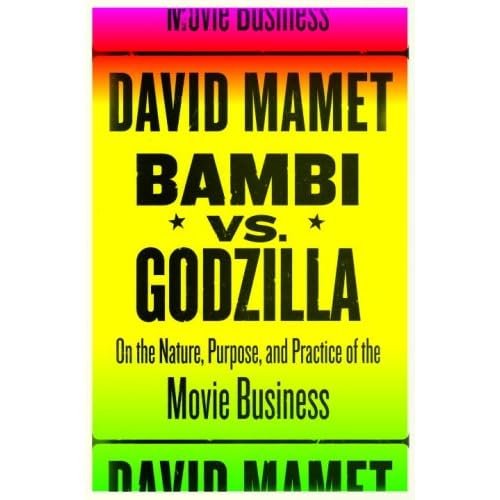 While unloading some books at Barnes and Noble a few nights back, a hideous neon cover appeared at the top of the box. I noticed the name David Mamet and decided to look a bit further. Mamet has writetn a more than his fair share of plays and screen plays that have made the silver screen. And while I liked some more than others, I at least have always found the dialogue thoughtful so I decided to pick up a copy of Bambi vs Godzilla
While unloading some books at Barnes and Noble a few nights back, a hideous neon cover appeared at the top of the box. I noticed the name David Mamet and decided to look a bit further. Mamet has writetn a more than his fair share of plays and screen plays that have made the silver screen. And while I liked some more than others, I at least have always found the dialogue thoughtful so I decided to pick up a copy of Bambi vs GodzillaI've only read about 40 pages into the book, but expect to be finished it in rather short time. Mamet tackles his topics in brief 8-10 page chapters or sections, and does not waste any words. He is tackling subjects far and wide throughout Hollywood.
Dark Comedy and Politics - Perhaps the success of Michael Moore's Farenheit 9/11 is due to its excellence not as a documentary but as a comedy. A comedy is teh form in which the unsayable is said, and that, thus, breaks the corrosive cycle of repression.
Victims and Villains - The film The Sum of All Fears discreetly brings the world to the brink of disaster because the Israelis have thoughtlessly misplaced one of their nuclear bombs...I predict a growth of the Jew as monster in the next few years' films. Well, why not? Bedoya and Huston inagurated a few years of the vicious Mexican...Jeremy Kemp et al made the British accent the tocsin of evil effectively for quite a while. So I shall naively opine that perhaps turnabout is fair play and it is merely the Jews' turn in the barrell.
Mamet, born into a Jewish family himself, has a lot to say about the Jewish role in Hollywood, at least in this first 40 pages. And he pulls no punches making it at times uncomfortable and eye opening. Perhaps, it's only that way for me because it is simply stuff I had not thought about before.
In a brief chapter titled An American Tragedy Mamet discusses the films The Jazz Singer and The Jolson Story. He uses them to discuss a tight little problem in American films where "the whites teach the blacks how to play jazz" and where "Gregory Peck, a Christian, impersonates a Jew (The Gentlemans Agreement 1947) and lectures his Jewish secretary on her lack of racial pride."
There are planty more moments just in the first 40 pages where Mamet makes ya sit back, pause, and think. And really, that's what I would expect from Mamet in my experiences watching his screenplays on film. I'm hoping the rest of the book lives up to the first 40 pages.
No comments:
Post a Comment